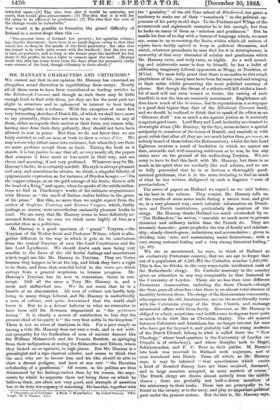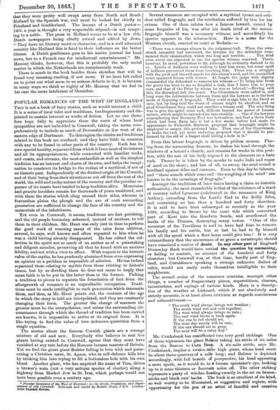MR. HANNAY'S CHARACTERS AND CRITICISMS.* Ws cannot say that in
our opinion Mr. Hannay has exercised an altogether sound discretion in republishing these essays. Nearly all of them seem to have been contributed as leading articles to the Edinburgh Courant, and though as such there may be little enough fault to find with them, yet they are for the most part too slight in structure and to ephemeral in interest to bear being strung together into a volume. With the exception of some few very interesting sketches of Dutch life, of which we shall have more to say presently, there does not seem to us, we confess, in any of them, either as regards their matter or their form, any reason why, having once done their duty gallantly, they should not have been allowed to rest in peace. But then we do not know that we are fairly entitled to call on man or book to show a raison d'être. We may not see why either came into existence, but when they are there we must perforce accept them as facts. Taking the book as it stands, it is but justice to say that all, or very nearly all, the papers that compose it have more or less merit in their way, and are clever and amusing, if not very profound. Whatever maybe Mr. Hannay's faults, he is certainly not dull. His style is always pleasant and easy, and sometimes he attains, we think, a singular felicity of epigrammatic expression, as, for instance, of Dryden he says :—" On the copper coinage, as on the gold coinage of his brain, there is still the head of a King," and again, when he speaks of the subtle indica- tions we find in Thackeray's, works of his intimate acquaintance with Horace as " the smell of Italian violets hidden in the green of his prose," But, this, no more than we might expect from the author of Singleton Funtenoy and Eustace Conyers, which, faulty perhaps as stories, were nevertheless eminently pleasant books to read. We are sorry that Mr. Hannay seems to have definitely re- nounced fiction, for we own we think more highly of him as a novelist than as a politician.
.Mr. Hannay is a good specimen of " genial " Toryism,—the '.Poryisni of Sir Walter Scott and Professor Wilson, which is alto- gether different in the way in which it gets at its conclusions from the cynical Toryism of men like. Lord Cranbourne and, the late Lord Lyndhurst. We should doubt such men being very sensible to the force of the old feudal feelings and associations which impel one like Mr. Hannay to Toryism. They are Tories because they happen to be at the top, and think they have a right :to be there, and from that scornful belief in the status gun which springs from a general scepticism in human progress. Mr. Hannay's Toryism has its root in veneration, theirs in con- tempt. Still all the same a Tory Mr. Hannay is, and a stout and atiffnecked one. We do not mean that he is a fanatic or an obscurantist. All-men ,of culture can hardly help being in many things Liberal, and Mr. Hannay is undoubtedly a man of culture, and quite determined that the world shall know it. But he is a devout believer in what we remember to have been told Dr. Newman stigmatized as " the gentleman heresy." It is clearly a source of satisfaction to him that the Present chief of his party is " the very first noble in the kingdom." There is not an atom of toadyism in this. For a peer simply as having a title Mr. Hannay does not care a rush, and is not with out sympathy for the Radicalism of mem of ancient descent like Sir William Molesworth and Sir Francis Burdett, as springing from their indignation at seeing the Sidmouths and Eldons, whom they looked on as upstarts, in high places. But Mr. Hannay is a genealogist and a ripe classical scholar, 'and seems to think that the 'men who are to favour him and his like should be able to - show a decent pedigree, and have at any rate " the Horatian scholarship of a gentleman." Of course, as his politics are thus determined by his feelings rather than by his reason, the argu- ments by which he supporta then' not being those on which he belleveathem, are often not very good, and strength of assertion Hats to do day for togetterof reasoning. He`has also, together with • Characters a Criticiser& A Book of Mitioolitthies. By Jtiineo'Hvaii■I'ai; : W. P. Nimroo. 180. the " geniality" of the old. Tory school of Blackwood, too great a tendency to make use of their " tomahawk " to the political op- ponents of his party in old days. To the Puritans and Whigs of the seventeenth and eighteenth centuries he is fair enough, but then he looks on many of them as "scholars and gentlemen." But he assails his foes of to-day with a licence of language which, we must say, seems to us to overstep the limits within which all writers of repute have tacitly agreed to keep in political discussion, and which, whatever precedents he may find for it in Aristophanes, is unworthy of that very character of scholar and gentleman which Mr. Hannay rates, and truly rates, so highly. As a well sound- ing and aristocratic name is dear to himself, he has a habit of addressing imaginary Liberal opponents as Blogg, or Tomkins, or M'Cad. We most fully grant that there is no malice in this rough playfulness of his ; many men have been farmore cruel and stinging in their satire whilst preserving the most polished courtesy of phrase. But though the thrust of a stiletto will kill whilst a hand- ful of mud will not even wound or bruise, the casting of such handfuls is not the less an unseemly amusement. Englishmen sel- dom know much of the Scotsman, but its, reputation as a newspaper is a good deal higher than that of the Edinburgh Courant itself, and we should be inclined to think that to speak of its editor as an "illiterate droll" was as much a sin against, justice as it certainly is against good taste. Lord Bury and Lord Amberley are treated to downright abuse (Mr. Hannay, by the bye, seems to have a special antipathy to members of the house of Russell, and reminds us with great relish that after all they are not much better than parvenus, as nobody heard of them before the Reformation), whilst the late Lord Eglinton receives a meed of laudation to which we cannot see that, amicable and well-meaning nobleman as he was, he has any claim save on the ground of his unflinching Toryism. We are sorry to have to find this fault with Mr. Hannay, but there is so much in his spirit that we cordially like and admire, and we are so fully persuaded that he is at bottom a thoroughly good- natured gentleman, that it is the more irritating to find so much of what he has written disfigured by such a flagrant " note of provincialism."
The series of papers on Holland we regard, as we said before, as the best in the volume. They consist, Mr., Hannay tells us,
of the results of some notes made during a recent tour, and give us, in a very pleasant way, much _valuable information on Dutch- men and Dutch institutions, particularly the position of the
clergy. Mr. Hannay thinks Holland too much overlooked by us.
" The Hollanders," he writes, " resemble us much more in private character and ordinary habits than the French do. They are intensely domestic ; great people for the ties of family and relation- ship ; steady church goers ; industrious and accumulative ; given to dividing into ' sets,' and maintaining social distinctions.; with a very strong national feeling and a very strong historical feeling."
(P- 48)- '
We are so accustomed, he says, to think of Holland as an exclusively Protestant country, that we are apt to forget that out of a population of 3,521,416 the Catholics number 1,220,087. This is due, he thinks, to the very respectable intellectual rank of the Netherlands clergy. No Catholic seminary in the country gives an education 'in any way comparable to that bestowed at the University of Leyden. There are, no less than nine different -Protestant communities, including the State' Church —thotigh the State pays all churches—but there is an almost total absence of hostility between them. The clergy of the Remonstrant eomtnunity, who represent the old Artninianism, are on the most friendly terms
• with the Calvinistic clergy of the State Church, and exchange ministerial offices with them freely. However, as Mr. Hannay is obliged to admit, scepticism and indifference to dogmas have quite as much to do with this as Christian charity. The old quarrel between Calvinists and Artitinians has. no longer interest for men who have got far beyond it, and probably half the rising students of the Dutch Church belong to what is called there the " New Theology," whose head-qttarters, is 'the University 'of Leyden (as Utrecht is of orthodoxy), and whose ' disciiales took to Hegel, Schleiermacher, and F. C. Baits as their guides. M. Renan's late book was received in Holland with eagerness, and at once translated into Dutch. From all which, as Mr. Hannay says, it may be inferred"" that speculations' -which excite a kind ot frenzied dismay here are 'there received, discussed, and in large measure accepted, as mere matters of course." The Dutch clergy are drawn almost entirely from' the middle classes ; there are probably not half-a-dozen mernbers of the aristocracy in their ranks. These last are principally to be found in the cavalry or in the nary, and play no jipportant political part under the present system. But the fact is, Mr. Hannay says, that they were pretty well swept away from North and South Holland by the Spanish war, and must be looked for chiefly in Friesland and Guelderland. The income of a Dutch pastor- 1401. a year is thought a very respectable stipend—is not tempt- ing to a noble. The press in Holland seems to he at a low ebb, Dutch newspapers being chiefly owned and edited by Jews. " They have no literary merit or charac ter, and in a well educated country like Holland this is fatal to their influence on the better classes. A Dutch gentleman goes to his native journal for local news, but to a French one for intellectual entertainment." Mr. Hannay thinks, however, that this is probably the only social matter in which the Netherlands are conspicuously weak.
There is much in the book besides these sketches that will be found very amusing reading, if not more. If we have felt called on to point out what seem to us serious defects in it, it is because in many ways we think so highly of Mr. Hannay that we feel in his case the more intolerant of blemishes.































 Previous page
Previous page